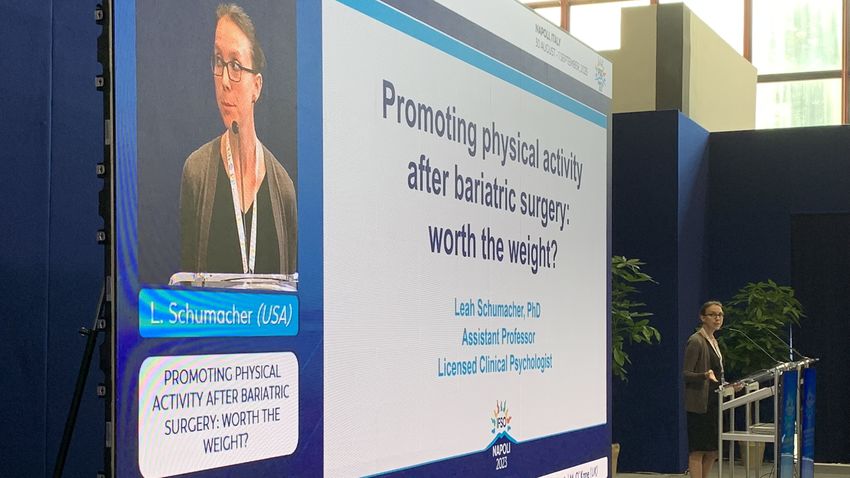
Leah Schumacher, assistant professor of social and behavioral sciences, took her expertise to Naples, Italy, in August. She was awarded a scholarship to attend and present at the annual World Congress of the International Federation for the Surgery of Obesity and Metabolic Disorders (IFSO), where top researchers and clinicians in bariatric medicine convene to share the latest research in their field.
“It’s important to see the research being done in different countries,” she says. “Healthcare systems are different, populations are different, and to some degree the types of interventions are different. In countries with nationalized healthcare, there might be more specific policies and more consistent access to different treatments—first you try this, then you try that—whereas in the U.S. a lot is dictated by your insurance coverage, by which hospital you go to. It might not be the same in Pennsylvania as in California.”
Schumacher is a clinical psychologist, and her research focuses on interventions that can influence behavior to promote physical activity and treat obesity among adults. “In recent years, that's included thinking about metabolic and bariatric surgery as a treatment option,” she says. “It's the most effective treatment option for obesity, but also the least used. By current estimates, about one or two percent of people who would be eligible for the surgery actually get it.”
One of her presentations, aimed at medical professionals, highlighted what Schumacher had learned from her patients as a psychologist promoting physical activity after bariatric surgery. It’s known that in the months following the procedure, patients can see weight loss of 20 to 35% of their initial body weight, but maintaining the loss isn’t a given. Lifestyle modifications including physical activity are important, and patients can face barriers to following through.
Schumacher said that in her experience, the patients who have the most success staying active after surgery were not doing it primarily for their weight on the scale—they were motivated more by other positive effects, such as improved mood and energy. She suggested a strategy for clinicians might be to focus on those more immediate benefits from exercise.
Another presentation described her study of 24-hour movement behaviors of patients after bariatric surgery.
"When we think about the 24-hour day, we sleep, we spend some time moving around, and we spend time being sedentary or sitting. How we split our time between those different behaviors can matter for health,” she explains.
Participants in the movement study wore wristband accelerometers to measure their activity, which was assessed at several intervals over the year following their surgery. The study found that light physical activity and overall physical activity did not change on average after surgery. However, those individuals who did become more active after surgery also lost more weight. Sleep time increased and sedentary behavior decreased, though those were not linked to weight loss. The findings, she said, could be used to inform interventions that clinicians offer patients.
Schumacher also is working on research into physical activity interventions for people who have chronic illness and increasing obesity treatment use among patients with diabetes. Some discussion at the IFSO conference focused on the new generation of diabetes medications that are adding to obesity treatment options for patients and in some cases can be used in combination with surgery.
Schumacher knows that treating obesity can require a multidisciplinary approach, and she appreciated the mix of professionals at the IFSO conference. “Many skill sets can be involved in treating obesity. There's a lot to learn about the treatment options, how to talk with patients,” she says. "We know obesity can be very stigmatized, and we know that each person's preferences can be very different.”
